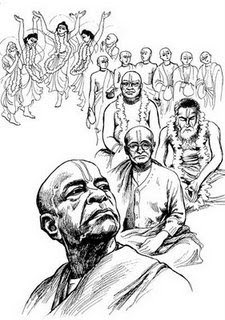[Evening program at Richmond, USA]
Podcast
Podcast Summary
The post To master the mind, become conscious of your consciousness appeared first on The Spiritual Scientist.
Websites from the ISKCON Universe
[Evening program at Richmond, USA]
Podcast
Podcast Summary
The post To master the mind, become conscious of your consciousness appeared first on The Spiritual Scientist.

Avanti Court School officially opens in Redbridge, UK.
The official opening of Avanti Court Primary School in Redbridge was mar...
 Highlights in this edition include: Gaura Purnima festival Ramanavami Festival, University Retreat, Soul Expressions with Radhanath Swami and Kirtan London, Sri Krishna Haveli Project Update, Synthesising Science and the Soul and more.
Highlights in this edition include: Gaura Purnima festival Ramanavami Festival, University Retreat, Soul Expressions with Radhanath Swami and Kirtan London, Sri Krishna Haveli Project Update, Synthesising Science and the Soul and more. 
The plight of man is a wonder indeed!
Once a man was chased by an elephant in a forest. Seeing no respite, he climbed a tree but he slipped, was about to fall before he could hold on to a branch. He looked up and found that the elephant is waiting to devour him and two rats, one black and one white, were slowly nibbling the branch he was hanging on to. He understood that very soon the branch would fall to the ground.
 By His Divine Grace A.C.B. Swami Prabhupada
By His Divine Grace A.C.B. Swami Prabhupada Herein lies the mystery of His transcendental knowledge. This mystery is transcendental love of Godhead, and one who is surcharged with such transcendental love of Godhead can without difficulty see the Personality of Godhead in every atom and every movable or immovable object. And at the same time he can see the Personality of Godhead in His own abode, Goloka, enjoying eternal pastimes with His eternal associates, who are also expansions of His transcendental existence. This vision is the real mystery of spiritual knowledge, as stated by the Lord in the beginning (sarahasyam tad-angam ca). This mystery is the most confidential part of the knowledge of the Supreme, and it is impossible for the mental speculators to discover by dint of intellectual gymnastics. Continue reading "I Myself exist within everything created, and at the same time I am outside of everything
→ Dandavats"
Два дня тому назад я после недолгой поездки в Австралию вернулся во Вриндаван. Завтра оставляю его ради проповеднических обязанностей на западе. Годы идут, и покидать трансцендентную обитель становится все сложнее и сложнее. Но мы должны – это приказ Шрилы Прабхупады своим последователям: делиться своей удачей со всем миром. Сегодня наткнулся на старое фото, на котором я следую по стопам за Шрилой Прабхупадой. Я посчитал это указанием: если он оставил Вриндаван ради проповеди, должно и мне. И ведь это то самое служение, которое делает нас квалифицированными, чтобы в должный срок вернуться во Вриндаван. Принимаю прибежище в словах Шрилы Прабодхананды Сарасвати:
«Наиудачливейший сможет обрести милость Чайтаньи Махапрабху. Насколько сможет он привлечь свое вниманье к лотосным стопам Шри Чайтаньи, настолько испробует нектар служенья лотосным стопам Шримати Радхарани во Вриндаване. Чем более участвует в служении Шри Чайтанье – тем более оказывается во Вриндаване, вкушая нектар служения Шри Радхе ». [Caitanya Candramrta, текст 88]
 By Hari Narayana Das
By Hari Narayana Das Sunday April 2, 2017, the old city in Semarang became crowded by people who wanted to watch ogoh-ogoh carnival. The Old City became witness of the diversity of the ethnic, religion, culture and faiths. Narayana Smriti Temple too was officially invited and the devotees pulled Lord Jagannath in the main streets of Semarang. “This is very good proposal. Make the Ratha-yatra festival very great success. This will be a great introduction in your city and people will appreciate it” (SPL to Syamasundara, 4th May, 1967) Continue reading "Lord of the Universe in the city of Semarang
→ Dandavats"
 Varuthini Ekadasi
Varuthini Ekadasi Japathon-Congregational Mantra Meditation
Japathon-Congregational Mantra Meditation Adult Education At The Temple
Adult Education At The Temple Upcoming Educational Course
Upcoming Educational Course Sunday School
Sunday School Monthly sankirtan Festival(MSF)
Monthly sankirtan Festival(MSF) The Mentorship Program
The Mentorship Program Gift Shop
Gift Shop
The 8th of April, 2017, marked the day when over 15,000 youths from across the state of Uttar Pradesh, India, got the chance to get inspired by spiritual wisdom in a grand event entitled as ‘Xpressions 2017’ in ISKCON Kanpur. Emphasizing on ‘De-addiction’ and ‘Value Empowerment’ within youth, ‘Xpressions 2017’ was an effort by a team of ISKCON devotees to bring the youth closer to their roots, re-introducing them to the rich cultural heritage they have inherited, focusing on the need for a positive approach to life, believing in themselves and working hard.

ISKCON’s Congregational Development Ministry, based in Mayapur, India, has launched a new online marriage counseling service that draws from Srila Prabhupada’s teachings. With the divorce rate in many countries at over fifty per cent, the search is on for the key to stable and successful relationships. According to the two consultants at new website Bhaktimarriages.com – psychotherapist and Vedic astrologer Sri Radha Govinda Dasi and writer and astrologer Manohar Pandit Das – an important element is training before marriage.

Two ISKCON authors have won in their categories at the Independent Book Publishers Benjamin Franklin Awards this year, which received nearly 1,400 entries published during the 2016 calendar year. Over 150 librarians, booksellers, and design and editorial experts judged the books submitted. Radhanath Swami’s “The Journey Within: Exploring the Path of Bhakti, A Contemporary Guide to Yoga’s Ancient Wisdom” won the gold medal in the Body, Mind & Spirit category.

Today, many schools in the U.K. and beyond are teaching children mindfulness, a widely acclaimed therapeutic technique that focuses our feelings, thoughts and emotions, and induces calm and emotional wellbeing. Jayadev Dasa, a well-known musician and kirtan singer from England, has written a book that teaches children mindfulness in a unique way – through fun Djembe drumming lessons. Jayadev, of course, was the drummer for the ‘70s pop group The Rubettes, which had a hit with “Sugar Baby Love” and sold twenty million records worldwide.

ISKCON Auckland NZ: Harinam (Album with photos)
Srila Prabhupada: Dancing is very good. The more you dance, the more you become light; means the burden of material contamination becomes reduced. Dancing is so nice. Even if you don’t feel ecstasy, if you dance by force, that will also help us. Krsnot-kirtana-gana-nartanau-parau premamrtambho-nidhi. By dancing, dancing, we shall develop our dormant Krsna consciousness, love for Krsna. This is a nice process. Krsnot-kirtana-gana-nartana-parau premamrtambho-nidhi. Then you will merge into the ocean of love for Krsna. So this is the highest stage of ecstasy for Krsna consciousness, always chanting Krsna’s name, dancing in ecstasy, and to be merged in the ocean of love for Krsna. These are the perfection. Srila Prabhupada’s lecture on The Nectar of Devotion – January 8, 1973, Bombay
Find them here: https://goo.gl/NlnJCV

Vrindavan Das’s Criticisms of Vaishnava Aparadha
Vrindavan Das primarily Mahaprabhu’s early activities such as his pastimes as a student, his childhood, his chastisement of the Qazi, his departure from Nabadwip, as well as some aspects of his life in Puri. Vrindavan Das Thakur demonstrated infinite mercy on the fallen souls by warning them:
eta parihare-o je papi ninda kare
tabe lathi maron tar shirera upare
Even after being told how objectionable it is, if someone still blasphemes the Vaishnavas, then I will kick him in the head.
These same words are repeated in the Adi, Madhya and Antya-khandas of the Chaitanya Bhagavat. Some foolish and arrogant persons misunderstand such statements and criticize Vrindavan Das for having made them. Such criticism leads them into the mud of offensiveness. In this connection, the remarks of Srila Bhaktisiddhanta Saraswati Goswami Thakur, the founder of the Sri Chaitanya Math and all the Gaudiya Maths, are well worth studying: “‘I am ready to kick the heads of those envious and hellish persons who blaspheme Nityananda Prabhu, if by so doing I will be able to forever prevent them from repeating their attempts to show disrespect for the Supreme Lord. Not only that, but if by so doing I can bring about a slear conception of the truth, I will be performing them the greatest service.’
“So says Vrindavan Das, the incarnation of Vyasa and acharya of the Vaishnava faith. If even a single fleck of dust should fall from his foot on the head of a sinful blasphemer, then that person will be blessed and all his sinful conditioning will inevitably be eradicated. In words which embody the Goddess of Learning and a flood of pure devotion, the Thakur reveals compassion for even the most atheistic blasphemer with the unswerving faith appropriate to a servant of Nityananda Prabhu, the supreme guru. He tells them that though they should be the object of indifference due to their foolishness, nevertheless, because of their ignorance of the truth of Nityananda, their insistence on rushing headlong on the path to hell, and their reluctance to act in their own real self-interest, he and other compassionate Vaishnavas like him who practice and preach the Lord’s doctrines unselfishly and disinterestedly act for their welfare. The compassion which is manifested in Vrindavan Das’s statement is beyond the comprehension of those who have no understanding of what is truly in their own self interest. Anyone who follows in the footsteps of Vrindavan Das, the incarnation of Vyasa, and both practices and preaches the Vaishnava religion is always engaged in an effort to bring about the ultimate well-being of everyone. Though he may make a superficial show of wishing to punish the enemies of the Lord, in fact he harbors a compassion toward them which knows no limit.”
Vrindavan Das Thakur’s disappearance day is the Krishna Dashami of Vaishakh. There is some dispute the exact year of his disappearance which was likely 1511 Shaka (1589 AD).
[Bhagavatam class at ISKCON, Chicago, USA]
Podcast
Podcast Summary
The post Focus on the Bhagavatam’s universal purpose beyond its specific details – invest one’s emotions in Krishna, not the world appeared first on The Spiritual Scientist.
Answer Podcast
The post Does courtesy japa help us attain Krishna after death? appeared first on The Spiritual Scientist.
Answer Podcast
Transcription :
Transcriber: Sharan Shetty
Edited by: Keshavgopal Das
Question: How can we know that we are progressing spiritually?
Answer: Bhagavad-gita 02.16 states, nasato vidyate bhavo nabhavo vidyate satah. The material is characterised by change and the spiritual is characterised by constancy. The material keeps changing but the spiritual never changes. When we are in material consciousness, we will be shaken by the changes in this world. To the extent we become spiritual, we will not be disturbed by the changes.
This world is like an ocean where there will always be waves. A person in an ocean will continuously be going up and down due to the waves. However, if the person gets into a boat which is anchored, then the shaking will be much less. Similarly, in this material world, there will always be changes causing anxiety, but when we become spiritual and connect with the unchanging reality God, then it is like sitting in a boat that is anchored. We connect with God through yoga, especially bhakti yoga, and it is like anchoring ourselves to a higher reality. When we do this, the shaking will reduce even further.
The more spiritual we become, the calmer we will be. We will be concerned but not disturbed. It does not mean that we will become uncaring or irresponsible. We have to function in the world and need to respond appropriately to the changes. When there will be changes in our life, we will work to rectify the situation but won’t be personally threatened by the change. The level of anxiety, stress, agitation going down is first marker of our progress in spiritual life.
Also, it is important to note that anxiety and craving are two sides of the same coin. To the extent we become spiritual, our craving for material things will go down. In material consciousness, self-worth is determined by what we possess. When our craving for material enjoyment goes down this indicates spiritual progress. This is second marker of spiritual advancement.
On a positive side, when we progress spiritually, we will start experiencing inner joy and peace. This is the third marker of our spiritual progress.
The more we advance; spiritual consciousness will become more and more our home territory. We do not always remain at home. Sometimes we also go out for work but then come back home after some time. Similarly, when we are in spiritual consciousness, it does not mean that we do not carry out our material responsibilities. Just like we come back home after completing our work, we come back to the spiritual consciousness after completing our material responsibilities.
In this way, by the decrease of anxiety, the decrease of craving and increase of joy and happiness in the spiritual realm, we can understand that we are progressing spiritually.
End of transcription.
Trancription in Hindi
प्रश्न: हम कैसे समझ सकते हैं कि हम आध्यात्मिक रूप से प्रगति कर रहे हैं?
उत्तर: आध्यात्मिक जीवन में प्रगति का पहला सूचक है जीवन से चिंता, तनाव और उत्तेजना का कम होना। भगवद्गीता 2.16 में कहा गया है – नासतो विद्यते भावो नाभावो विद्यते सतः। अस्थिरता भौतिक जीवन का लक्षण है और स्थिरता आध्यात्मिक जीवन का। जब हम भौतिक चेतना में स्थित होते हैं, तब हम इस संसार की अस्थिरता से भी प्रभावित होते हैं। हमारी चेतना जितनी आध्यात्मिक होती जाएगी, उतना ही वह भौतिक अस्थिरता से विचलित नहीं होगी।
यह संसार एक सागर की भाँति है जहाँ सदा लहरें उमड़ती रहती हैं। मनुष्य को इन लहरों के उतार-चढ़ाव से निरंतर संघर्ष करते रहना पड़ता है। ऐसे में मनुष्य यदि किसी लंगरयुक्त नौका में बैठ जाए, तब डगमगाना बहुत कम हो जाता है। इसी प्रकार, इस भौतिक जगत में सदा व्याकुल करने वाले परिवर्तन होते रहते हैं किन्तु जब हमारी चेतना आध्यात्मिक हो जाती है और चिरस्थायी परम तत्व भगवान से जुड़ जाती है, तब वह एक लंगरयुक्त नौका में बैठे रहने जैसा होता है। जब हम योग, विशेषकर भक्तियोग, के माध्यम से भगवान से जुड़ते हैं तो यह ऐसा है मानो हमने स्वयं किसी बड़ी वास्तविकता को कसकर पकड़ लिया हो। ऐसा करने के बाद जीवन में डगमगाना बहुत कम हो जाता है।
हम जितना अधिक आध्यात्मिक होंगे, उतना ही शांत रहेंगे। हम परिस्थितियों से चिंतित हो सकते हैं किन्तु व्यथित नहीं। इसका अर्थ लापरवाही अथवा गैरजिम्मेदारी नहीं। हमें संसार में अपने दायित्व का निर्वाह भी करना है और अस्थिरता का सामना भी। आध्यात्मिक रूप से उन्नत होने पर जब हमें जीवन में अस्थिरता का सामना करना पड़ेगा तब हम उसे धैर्य के साथ कर पाऐंगे और अस्थिरता के कारण विचलित नहीं होंगे।
साथ ही, यह ध्यान रखना भी महत्वपूर्ण है कि चिंता-तनाव और भौतिक वस्तुओं की लालसा एक ही सिक्के के दो पहलू हैं। जितना हम आध्यात्मिक होते जाएंगे उतना ही भौतिक वस्तुओं के लिए हमारी लालसा कम होती जाएगी। भौतिक चेतना में, हम अपना मूल्यांकन इस आधार पर करते हैं कि हमारे पास कितनी धन-संपत्ति है। जब भोग-विलास की हमारी लालसा कम होने लगे तब समझ जाऐं कि हम आध्यात्मिक प्रगति कर रहे हैं। यह आध्यात्मिक प्रगति का दूसरा सूचक है।
चिंता-तनाव का कम होना, भोग-विलास की लालसा का कम होना – इनमें हमारे भीतर की नकारात्मकता घटती है। आध्यात्मिक प्रगति के कारण एक सकारात्मक बदलाव भी होता है। जैसे-जैसे हम और अधिक आध्यात्मिक प्रगति करेंगे हम शांति और आंतरिक आनंद का अनुभव भी करने लगेंगे। यह हमारी आध्यात्मिक प्रगति का तीसरा सूचक है।
इस प्रकार हम जैसे-जैसे आध्यात्मिक प्रगति करते जाऐंगे उतना ही अधिक आध्यात्मिक चेतना हमारे मन में अपना स्थान बनाती जाएगी । हम घर पर ही सारा समय नहीं बिताते, कभी-कभी हम काम के लिए घर से बाहर भी जाते हैं किन्तु फिर कुछ समय पश्चात घर वापस आ जाते हैं। इसी प्रकार, जब हमारी चेतना आध्यात्मिक हो जाती हैं, तो इसका अर्थ यह नहीं कि हम अपने भौतिक उत्तरदायित्वों को भूल जाते हैं। जैसे हम अपना काम पूरा करके घर वापस आ जाते हैं, वैसे ही हम अपनी भौतिक उत्तरदायित्वों को पूरा करके पुनः आध्यात्मिक चेतना में लौट आते हैं।
इस प्रकार जीवन में चिंता-तनाव, भोग-विलास की लालसा में कमी होना तथा आनंद और प्रसन्नता में वृद्धि होना जैसे सूचकों से हम समझ सकते हैं कि हम आध्यात्मिक प्रगति कर रहे हैं।
End of transcription.
Answer Podcast
The post When past karma blocks our bhakti, what can we do? appeared first on The Spiritual Scientist.
Answer Podcast
The post How do I choose my spiritual master? appeared first on The Spiritual Scientist.
Answer Podcast
The post Amidst problems, should we just let Krishna solve them or should we work to solve them? appeared first on The Spiritual Scientist.
Answer Podcast
The post While making choices, how can we take Krishna’s shelter? appeared first on The Spiritual Scientist.
Answer Podcast
The post If karma, daiva and kala lead to phala, what is Krishna’s role? appeared first on The Spiritual Scientist.
Answer Podcast
The post If parents have two children – one bright, one dull – is it the parents’ karma or the childrens’ karma? appeared first on The Spiritual Scientist.
Answer Podcast
The post When our sadhana oscillates because of material ups and downs, what can we do? appeared first on The Spiritual Scientist.